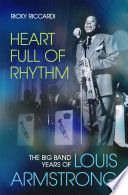2018 School Spending Survey Report
Heart Full of Rhythm: The Big Band Years of Louis Armstrong
COPY ISBN
VERDICT Though sometimes overly enthusiastic about Armstrong and presenting more detail than most general readers need, Riccardi produces a meticulously researched but readable account that jazz fans will embrace as a standard work about the iconic trumpeter. [See Q&A, p. 69.]
RELATED
ALREADY A SUBSCRIBER? LOG IN
We are currently offering this content for free. Sign up now to activate your personal profile, where you can save articles for future viewing




Comment Policy:
Comment should not be empty !!!